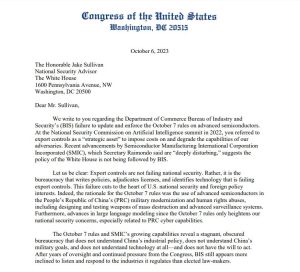
Republican Push for Stricter Chip Export Rules to China
On Friday, October 6, two senior Republican members of the United States House of Representatives implored the Biden administration to tighten export controls regarding the transfer of advanced computing chips and the associated manufacturing tools to China.
In a letter to National Security Adviser Jake Sullivan, Representative Michael McCaul, chairman of the House Foreign Affairs Committee, and Representative Mike Gallagher, chairman of the House Select Committee on China, stated that China’s leading chip manufacturer’s recent technological advancements highlight the need to revise the 2022 comprehensive regulations.

Screenshot of the letter urging tighter control of advanced semiconductors. Source: foreignaffairs.house.gov
They stress the importance of addressing what they perceive to be deficiencies or “loopholes” in the existing rules. The letter followed the introduction of the Mate 60 Pro smartphone by Huawei Technologies, which incorporated chips manufactured by China’s Semiconductor Manufacturing International Corp(SMIC).
This occurred despite American sanctions. In their letter, McCaul and Gallagher stated, “The rules introduced on October 7 and the expanding capabilities of SMIC illustrate an inert and opaque bureaucratic system that lacks insight into China’s industrial strategy, fails to comprehend China’s military objectives, and demonstrates a lack of technological understanding.
In addition, it appears to lack the resolve to take effective action.” Legislators urged the Biden administration to modernize regulations and respond expeditiously to Huawei and SMIC.
In addition, they urged the administration to deny Chinese companies access to powerful artificial intelligence processors that are accessible via cloud computing services.
In addition, they emphasized the significance of enforcing the administration’s existing restrictions on Chinese businesses, particularly those that prevent U.S. officials from verifying compliance with U.S. export regulations.





